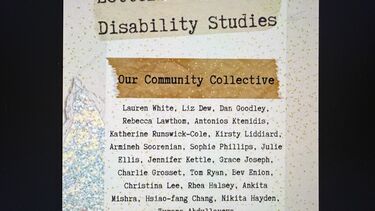Letters to Critical Disability Studies
On the 17th July 2025, The Critical Disability Studies team met to think about who we are and the work we do within the field. This was supported and facilitated by the creative work and community spirit of Dal Kular.

Letters to Critical Disability Studies
On the 17th July 2025, The Critical Disability Studies team met to think about who we are and the work we do within the field. This was supported and facilitated by the creative work and community spirit of Dal Kular. You can find out more about Dal’s work via this page.
Our event began with introductions and collective welcomes, supported by verbal and affirmative chants where we said hello to each other. Dal then began with a series of provocations, designed alongside Dan Goodley and Liz Dew. The key prompt was ‘What are the key social, cultural, economic and relational challenges that critical disability studies researchers should engage with?’ This was then supported by creative interpretations and provocations by Dal which included ‘Dear Critical Disability Studies’ and thus formed the culmination of this work.
As a result of the day and our group discussions, we gathered individual and collective poetry, statements, shopping lists, letters and calls to action. These were shared, performed and presented as spoken words. Captured by the emotion, affect and spirit of such contributions, we decided to document these as testimony to our work. These have been carefully curated by Lauren White as the Critical Disability Studies Research Cluster Lead in the School of Education. As part of our commitments to accessible methods, events and dissemination, we have provided our contributions and engagement in a number of formats: Visual format (PDF, 1.2MB); Written Transcript (DOC, 14KB) and; Audio recording (17:35 in length).
We’d like to thank The Wellcome Trust and iHuman for funding and supporting this work.
We’d love to hear from you. If you are interested in any of this content or would like a physical copy of the booklet, please contact l.e.white@sheffield.ac.uk or e.dew@sheffield.ac.uk

iHuman
How we understand being ‘human’ differs between disciplines and has changed radically over time. We are living in an age marked by rapid growth in knowledge about the human body and brain, and new technologies with the potential to change them.
